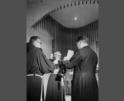
Culture
'Though she experienced both anti-Catholic and anti-black intimidation, she nevertheless responded to her calling to teach and to serve God...'
Anne Marie Becraft was born in 1805 and lived her life in the Washington, DC, and Baltimore, Maryland, areas. Becraft, a free Black woman, devoted her life to education and faith. At the age of 15, she took it upon herself to start "one of the earliest schools for black children" in the area, Villanova History Professor Shannen Dee Williams writes. She had a specific commitment to Black girls: "She was a devout Catholic and deeply committed to educating young girls of color in the nation's capital. Though she experienced both anti-Catholic and anti-black intimidation, she nevertheless responded to her calling to teach and to serve God," writes Georgetown History Professor Marcia Chatelain. Once she had ensured that the school she began in the Georgetown area of D.C. was in good hands, Becraft moved to Baltimore to pursue her vocation. After being denied entrance into white orders of women religious, she entered into the Oblate Sisters of Providence, the first order of Black women religious in the US, and took the name Sister Mary Aloysius. Becraft passed away only two years later at the age of 28, in 1833, from a "chest malady of which she felt the first attack when she was 15 years of age.
Becraft's legacy lives on in several ways. "Despite her relatively short life," Williams writes, "the significance of Becraft's insurrectionary presence and that of her black Catholic girls' academy within the sight of the Visitation Convent, where more than 80 enslaved people labored against their wills, and Georgetown, where more than 250 did the same, cannot be overstated." Georgetown University, founded by a relative of Becraft's, has chosen to honor her by renaming a building on campus in her name. The building was previously named after William McSherry, SJ, a Georgetown Jesuit who oversaw the sale of 272 enslaved people owned by the Maryland Province of the Society of Jesus. The profits of the sale buoyed the university in a time of deep debt, effectively saving Georgetown from financial ruin. As an alumnus of Georgetown, I was and am personally proud to see my alma mater make this first step toward reconciliation and reparations for their engagement in slavery, on which their campus and my education were built.
Now that we have "seen" -- we have learned more about Anne Marie Becraft and her revolutionary legacy -- I invite us to take the time to "judge": what does our faith compel us to do with this information? How is God asking us to respond, to honor the life and work of Becraft and so many other Black Catholics like her? Ultimately, I invite us to "act": maybe we will be inspired by Becraft and use our time, treasure, or talent to fight for the education of Black children in the US and to disrupt the school-to-prison pipeline, which disproportionately affects children of color. Maybe we will take the time to listen to the experiences of other Black Catholics -- especially Black Catholic women -- in our nation, our diocese, or our parish. Or maybe we will simply learn more about the history and legacy of Black Catholics in the US, starting with the Church's history of enslavement. Keep an eye out for the next installment in this series so you can learn more about Black Catholics in the US and celebrate Black Catholic History Month!
JUSTINE WORDEN IS AN INTERN WITH THE ARCHDIOCESE'S SOCIAL JUSTICE MINISTRY AND A MASTER OF DIVINITY STUDENT AT THE BOSTON COLLEGE SCHOOL OF THEOLOGY AND MINISTRY.
Recent articles in the Culture & Events section
-
Scripture Reflection for Nov. 24, 2024, Solemnity of Our Lord Jesus Christ, King of the UniverseDeacon Greg Kandra
-
Seeds of graceMolly M. Wade
-
The dedication of St. Francis Chapel in the Prudential CenterThomas Lester
-
Honeybees are taking over for canariesDeacon Timothy Donohue
-
Why we celebrate ThanksgivingRussell Shaw


















